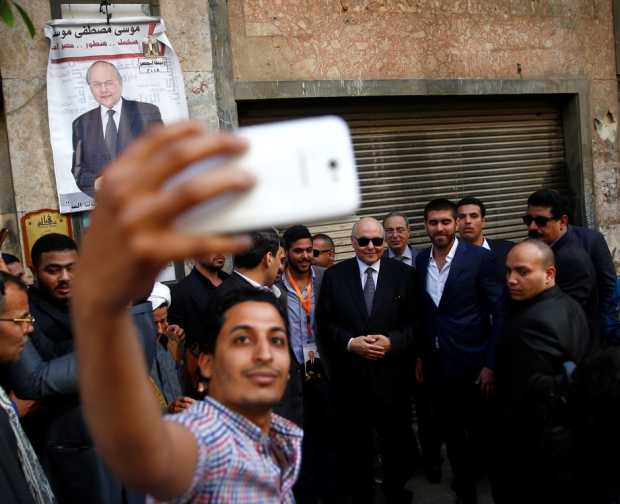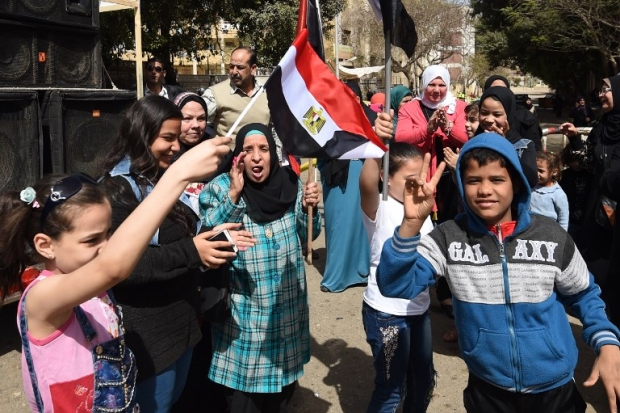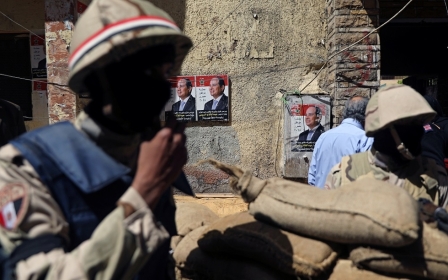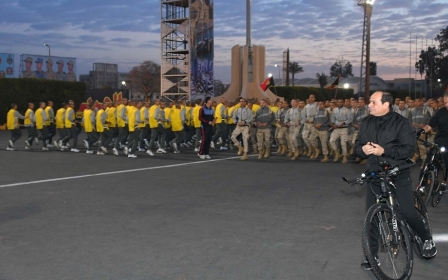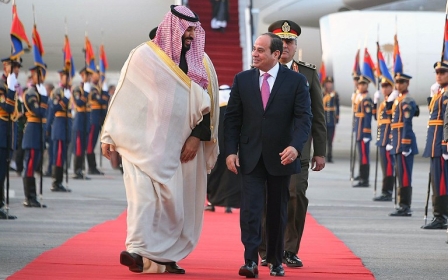Elderly, not youth, heed Sisi calls as Egypt’s presidential election kicks off
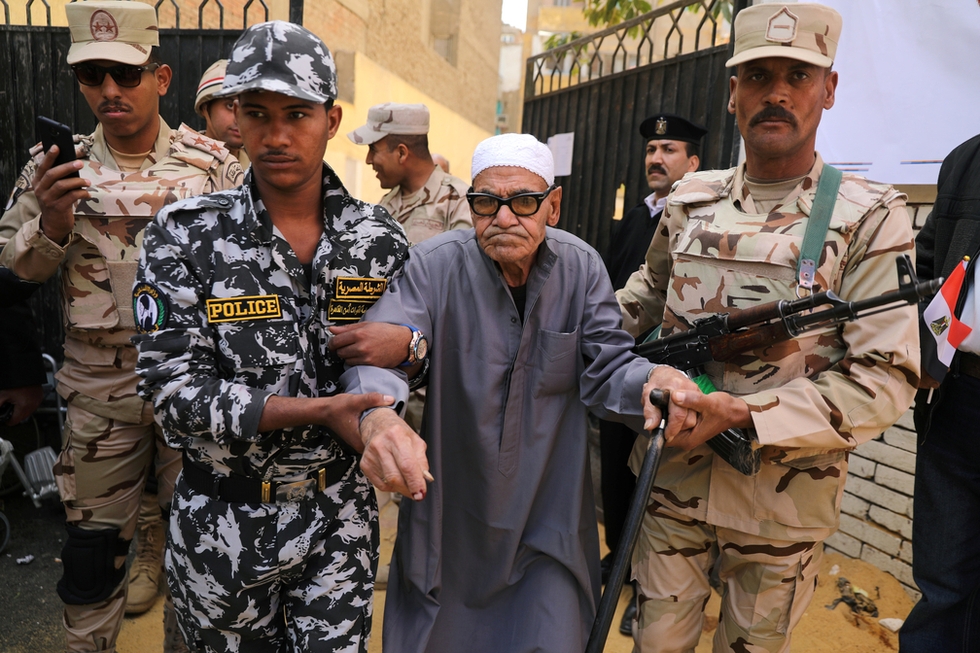
CAIRO - When a young passerby appeared to poke fun at elderly voters casting their ballots in Egypt’s presidential election, they hit back with a rant and called him a traitor. It was a heated exchange that underscored a clear-cut generational gap as polls opened on Monday.
With the election outcome considered a foregone conclusion and incumbent Abdel-Fattah al-Sisi all but assured a second four-year term, the question was whether the majority of voters would head to the polls.
'When the old people vote in this sham election, they will have a hand in all of our suffering under the current regime'
- Sherif, 24, accountant in Cairo
A 24-year-old accountant in Cairo’s middle-class district of Sayyida Zeinab told Middle East Eye that he hadn't meant to make fun of the voters, but was rather disappointed that the queue he passed by was filled with older people.
“I know that they care about the country, but they are actually doing harm to it by participating in this vote," said Sherif, who only agreed to give his first name. "We all know that there is no election; we are ruled by an iron fist, and that’s it. There is no hope."
“When the old people vote in this sham election, they will have a hand in all of our suffering under the current regime. I can’t understand why they are not sharing our fears and aspirations for a better future. They are insisting on bringing us down with them.”
New MEE newsletter: Jerusalem Dispatch
Sign up to get the latest insights and analysis on Israel-Palestine, alongside Turkey Unpacked and other MEE newsletters
The presidential election, which will last for three days, kicked off despite opposition calls for a boycott. Critics have said the vote is a one-man show, not a real contest.
Over the course of the day, pro-state media called incessantly on eligible voters to take part, focusing less on the issues and more on the turnout.
Sisi, who came to power in 2014 following the army’s overthrow of Islamist president Mohamed Morsi a year earlier, faces one challenger: Al-Ghad party leader Moussa Mostafa Moussa, himself a Sisi supporter.
The little-known Moussa, who has insisted that he is a not a “puppet”, encouraged a high turnout as he cast his ballot in downtown Cairo.
In a January speech, Sisi also urged Egyptians to vote in large numbers. “Say whatever you want, but go and take part in the election so that you will have a clear conscience that you have not given up your role and right,” he said.
As an incentive, Cairo’s famous amusement park, Dream Park, offered a 50 percent discount for anyone “whose finger is stained with the ink that proves his/her participation”.
'Sisi is my love'
Nationalist songs were played from the early morning as voters lined up even before the polls opened at 9 am. Loudspeakers were installed at almost every single polling station, a familiar scene of other elections over the past four years.
Most of the elderly voters which Middle East Eye spoke with in different parts of the capital agreed that Egypt was enduring tough economic times, but said they were confident that Sisi’s austerity measures would eventually lead to a better future.
In late 2016, Sisi launched an ambitious reform programme to revive the ailing economy, including floating the Egyptian pound. Such measures, he said, were long overdue, but critics argued that they would only worsen living conditions in a country where close to 30 percent of its people live below the poverty line.
Several voters said security was a higher priority to them than anything else and paid tribute to the general-turned-president for “keeping Egypt safe in the face of many regional threats”.
“The fact that we didn’t enter any wars is in itself enough for me to vote for Sisi," said Sayed Farid, a 65-year-old pensioner, in Cairo’s Hadayek El-Maadi district. "Look at neighbouring countries like Syria and Iraq; Sisi spared us a similar fate."
He added: “Regarding the economy, we just need to be patient as the president has said. Things will only get better.”
A higher-than-expected turnout could embolden Sisi to continue his reform programme, with more subsidy cuts expected in the summer under the terms of a $12 billion loan agreement with the International Monetary Fund.
“Sisi is my love. I can’t get those who are doubting him. They must be crazy!” said 50-year-old Latifa El-Sayed, speaking in front of a polling station in Qasr El-Ainy, one of the major thoroughfares of the capital.
Monday was trouble-free amid heightened security following an assassination attempt on Alexandria’s security chief on Saturday.
A bomb left beneath a car blew up as Major General Mostafa al-Nemr drove in a convoy through Egypt’s second-biggest city. The security chief escaped unharmed, but the bomb killed two police officers and wounded five others.
The Egyptian branch of the Islamic State group, based in North Sinai, released a video last month in which it warned Egyptians against voting and said it would target security forces during the election.
Heartbreaking
Although some young female voters were present in women-only polling stations which MEE visited, the presence of youths was minimal on the first day of voting in the Egyptian capital.
The mood was subdued mainly in Tahrir Square, the cradle of the 2011 revolution where thousands of protesters camped for 18 days, eventually unseating autocratic leader Hosni Mubarak.
On the side of the square, passersby stopped to take pictures of tens of people wearing Sisi shirts and chanting nationalist slogans. For Mohamed Farouk, a 30-year-old engineer, the scene was heartbreaking.
“I remember when we were here chanting wholly other slogans,” he said, rolling his eyes.
“They are chanting a person’s name now, but we were chanting ‘bread, freedom and social justice’."
Middle East Eye delivers independent and unrivalled coverage and analysis of the Middle East, North Africa and beyond. To learn more about republishing this content and the associated fees, please fill out this form. More about MEE can be found here.


